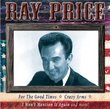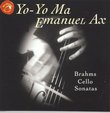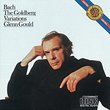| All Artists: Rodney Gilfry, Johannes Brahms, John Eliot Gardiner, Orchestre Revolutionnaire et Romantique, Charlotte Margiono Title: Brahms: Ein deutsches Requiem Op.45 Members Wishing: 1 Total Copies: 0 Label: Philips Release Date: 5/10/1991 Genre: Classical Styles: Opera & Classical Vocal, Historical Periods, Early Music Number of Discs: 1 SwapaCD Credits: 1 UPC: 028943214025 |
Search - Rodney Gilfry, Johannes Brahms, John Eliot Gardiner :: Brahms: Ein deutsches Requiem Op.45
 | Rodney Gilfry, Johannes Brahms, John Eliot Gardiner Brahms: Ein deutsches Requiem Op.45 Genre: Classical
Musical settings of the Requiem understandably encompass a vast expressive gamut, from Mozart's fear and trembling to the seraphic gentleness of Fauré. But the focus in Brahms's German Requiem--his first large-scale ... more » |
Larger Image |
CD DetailsSynopsis
Amazon.com Musical settings of the Requiem understandably encompass a vast expressive gamut, from Mozart's fear and trembling to the seraphic gentleness of Fauré. But the focus in Brahms's German Requiem--his first large-scale work--is not so much on the departed as on those left behind and the work of memory. In lieu of the traditional Latin liturgy, Brahms uses texts culled from the Lutheran Bible that range from despair at our mortal condition to the solace offered by faith. John Elliott Gardiner and his forces here attempt to replicate the orchestral sound and style of Brahms's own time, using period bowing practices for the strings and mellow Viennese horns, to cite a few examples. The result is a magnificent and deeply moving performance that features excellent integration of the orchestra and chorus. Gardiner molds a huge crescendo of imposing terror in the funereal march of the second movement but always keeps the textures clear and balanced. He manages to convey both the symphonic scope of this work and its polyphonic imagination--Brahms looked back to Baroque as well as Renaissance sources and in the process created a rich and potent new style. Charlotte Margiono's rosy soprano is angelic but at the same time tinged with a sense of longing for what has been lost--which makes the musical consolation offered by the end of the seventh movement all the more profound. Baritone Rodney Gilfry brings warmth and passionate phrasing to his solos. And presiding over everything is Gardiner's masterful sense of the work's larger structure: the path traced by Brahms is revealed with great dignity but is free of sentimentality. This recording belongs in any basic collection. --Thomas May Similarly Requested CDs
|
CD ReviewsBrahms in His True Character, Bold, Fresh & Clean Karl Henning | Boston, MA | 12/08/2000 (5 out of 5 stars) "A performance of Brahms "free from sentimentality" is an interesting question.And I won't pretend to be perfectly impartial to the question.The "German Requiem" is something of an old friend. I'm a clarinetist who has served as a bass in various choruses over the years, so I have taken part in two performances of this magnificent work, alternatively as instrumentalist and singer. And before that, I was introduced to "How Lovely is Thy Dwelling Place" (in English translation) in the choir of an Episcopal parish, by a director whose fondness for the piece was evident in his management of the choir that Sunday.Probably, none of these performances was quite free from sentimentality; but my impression is that none of these performances suffered greatly from the sentiment brought to the piece, brought out of the piece. Hey, the nineteenth-century was something of an Age of Sentiment, in music. It would be dishonest and musicologically suspect to prune away all sentimentality from the music of that day.Which is not to say that the sentimentality cannot be overdone, hideously overdone.I am a great fan of Brahms. Love the clarinet sonatas, the symphonies, the violin concerto, the piano concerti, the solo piano music, the lieder. And especially the German Requiem.And this is all preface to a description of Gardiner's recording of this last.It is not excessively sentimental; which is all to the good.Nor is it soullessly dry, which is better still.The character of Brahms' work sings through here (Brahms' music ALWAYS sings, whether there are voices or no - so different in so many respects, Brahms and Chopin are alike in this, that their music sings like angels hovering over a child's cradle; even when the music surges towards forte, there is something assuringly like a lullaby about it). I want to say this performance is perfect. Not in any exclusionary sense, to say that no other performance which may do things differently is necessarily inferior. But in the plain sense that everything in this performance works; that everywhere, the music says convincingly what the composer meant it to say; that without ever yielding to sloppy affection for the music, the performance brings out the music's heart. The performance has both the voluptuous softness which is really a quality of the music, and the direction and focus which makes it work, which makes it artistic, which displays its true genius.The great service Gardiner does Brahms here is, ironically, something of a rehabilitation. Brahms' music sometimes suffers from its easy popularity, and his reputation is sometimes sullied by the sloppy affection I mentioned above; not everyone who wishes to do Brahms' music, does it brilliantly well. Gardiner here does it brilliantly well. This is fresh, unrumpled Brahms. Listen again, this recording bids us, for the first time." Very transparent and especially graceful in chamber textures Yi-Peng | 10/21/1999 (4 out of 5 stars) "The recordings I'd like to review here are (a) John Eliot Gardiner with the Orchestre Revolutionaire et Romantique / Monteverdi Choir (1990) [PHILIPS 432 140-2] and (b) Carlo Maria Guilini with the Vienna Philharmonic / Wiener Staatsoperchor (1988) [DEUTSCHE GRAMMOPHON 432 574-2].For the last twenty years John Eliot Gardiner has been associated with a rather scholarly approach to performance practice involving period instruments, obsolete tuning systems, and unusual bowings. Some argued that his approach had turned music into museum culture, thus alienating already flustered audiences; others saw in it a true revival of the music tarnished by centuries of irreverent incompetence. Gardiner's experience with the Baroque invariably comes across in the Brahms Requiem, particularly in the handling of choral polyphony modelled upon Schütz and Palestrina. Facilitated by the orchestra playing period instruments, Gardiner consciously attempts to 'free the work from the tradition of solemn, but smooth performances, by concentrating on the ruggedness of the original score.'Carlo Maria Guilini represents an entirely different tradition, very much a Romantic one, less keen on details, concerned with thicker brush strokes and the overall Stimmung. Guilini's approach to this work is almost solely based upon its roots in the grand symphonic and choral traditions. His main fortes are the soloists Barbara Bonney and Andreas Schmidt, and an orchestra capable of producing mighty climactic textures.The discrepancies between the performances are most discernible in the second movement 'Denn alles Fleisch, es ist wie Gras' and the sixth movement 'Denn wir haben hie keine bleibende Statt'. In the beginning of the second movement Gardiner's muted violins have a particularly silky 'autumnal' quality, as opposed to Guilini's rather metallic sound. However, Gardiner's brass is much harsher than that of Guilini. Whereas Gardiner's use of vibrato is quite scarce, Guilini uses it almost ubiquitously. By and large, the balance is superior in the Guilini performance. Guilini's timpani played with soft mallets, despite their anachronistic use, create a better support for the orchestra.From the outset of the sixth movement one is forced to think of the Credo from Bach's B minor Mass due to the manner in which Gardiner executes the 'walking' bass accompaniment (or Baroque recitatives in the case of his baritone solos). His greatest asset is the chorus-clear, expressive, and always in tune, which is not unimportant (e.g. 'Herr, du bist würdig' fugue)! One may object to some of his tempo choices, as in the above-mentioned fugue, where the reading of Brahms's Allegro marking as Allegro moderato or Allegro ma non troppo results in the loss of momentum. However, he manages to achieve remarkable rhythmic clarity at Vivace later on, particularly in his execution of the triplet figures that are completely lost in the stormy Guilini performance. Gardiner's performance is very transparent and especially graceful in chamber textures. Partly because of this transparency, one can, for instance, distinctly hear the organ towards the end.Guilini's performance of this movement is overtly Late-Romantic, even somewhat Brucknerian, particularly in the gradual textural build-up of 'zu nehmen Preis und Ehre' and the climactic ecstasy of 'Tod', 'Hölle', 'Wo', 'Sieg' and 'Kraft' . His wonderfully piercing trombones at 'letzten Posaune' and 'Tod' coupled with the incredibly gritty-sounding strings produce a truly stunning effect. Despite the over-emphasised portamenti and an excessively operatic baritone Andreas Schmidt utilising the 'spitting consonants' singing style, it is a very clear performance with a firm grip on the piece's overall form and structure.With all due respect, I find Gardiner's Requiem rather experimental in his search for a kind of 'historical truth' than Guilini's bold Romanticism, although much less researched. Yet both maestri's renditions reveal the basic dichotomy present in the music itself; namely, Brahms's keen interest in the past combined with the burning desire to break new spiritual and musical grounds. Ein Deutsches Requiem is a good specimen of this tendency, and perhaps on the basis of this one can grow to appreciate both recordings." Wonderful, fresh Brahms Requiem Yi-Peng | Singapore | 08/24/2003 (5 out of 5 stars) "Compared to the person who wrote the scathing review that lurks on these pages somewhere, I find that I have some rather positive things to say about this recording of Brahms's choral masterpiece. Firstly, unlike most recordings you hear of the piece, this recording is free of the slow, mannered Wagnerian speeds that have dogged the piece for many years. This recording, which follows Brahms's original speeds, really makes the supple melodies soar and sing out to us, yet remain sublime and heartfelt at the same time. Secondly, this recording shows a sense of commitment in everyone involved. Apart from the clean and transparent recording, the period orchestra is well-balanced and the choral singing is first-rate. Even in the solemn movement, "Denn alles Fleisch", there is a sense of seriousness and devotion throughout. But perhaps the real highlights are the soaring and lyrical "Wie lieblich sine Deine Wohungen" and the closing and comforting "Selig sind der Toten." The two soloists are first-rate, with Charlotte Margiono displaying a motherly warmth in her solo number, and Rodney Giffry making a vulnerable but submissive soloist who also sings his solos in the sixth movement with a certain hope in his voice. This is indeed a wonderful recording, and a fresh view at a masterwork that has been dogged by stodgy interpretations, and the crisp choral singing is an added plus."
|

 Track Listings (7) - Disc #1
Track Listings (7) - Disc #1








